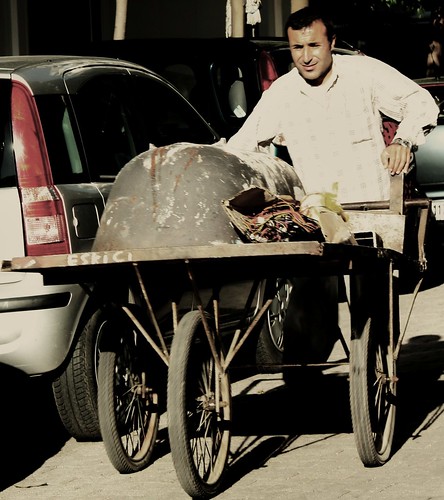When PocketCultures contributor Nargiza was in Istanbul airport recently, she snapped this photo of separated bins for recycling waste.

Sights like this are quite new in Turkey. But in comparison to other European countries Turkey recycles many more things in an ‘informal’ manner.
In Turkey, if something can be re-used, chances are it will be: the eskici passes in front of my house at least once per week to collect unwanted furniture, broken electronic goods and anything else that isn’t needed any more; another man patiently combs through rubbish bins to salvage empty plastic bottles; a neighbour takes away all my empty glass jars to fill with home-made pickles and sauces.
The overall volume of rubbish that actually gets sent to landfills is much lower than in many other countries in which I’ve lived.

The eskici passes regularly to collect unwanted goods
Official figures confirm this observation. In 2008 (the latest year for which measurements are available) Turkey produced 428kg municipal waste per inhabitant per year, which is lower than every country in the EU-15.
For comparison, Sweden produced 515kg per capita, UK produced 565kg per capita, and Spain produced 575kg per capita. The ‘winner’ is Denmark, which produced 802kg of waste per person. (Source: European Environment Agency)
Maybe the most interesting answer is one I received from the local council in the town where I live.
According to them, the local government does not need an official recycling programme. Instead private companies compete for permission to collect waste for recycling, because it is so profitable.
Read more
Organic recycling in Indonesia
How to reduce emissions without reducing growth
Tulip: symbol of abundance, indulgence and Istanbul




